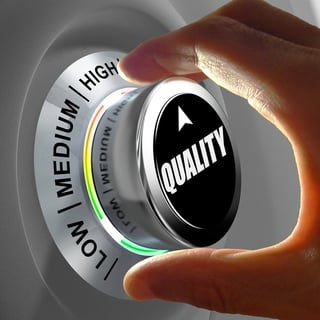 For the first time ever, this week Google released the full version of its Search Quality Raters guidelines and handbook. Essentially it is the guidebook it’s raters use to determine how relevant a page is to a search query. It is 160 pages of indepth SEO knowledge, so it’s much too dense to break down in just one blog post. However, main topics can be easily digested one at a time. For the purpose of this post, let’s dive into how the guide characterizes a “High Quality Page.” This is certainly a title you want for your webpages.
For the first time ever, this week Google released the full version of its Search Quality Raters guidelines and handbook. Essentially it is the guidebook it’s raters use to determine how relevant a page is to a search query. It is 160 pages of indepth SEO knowledge, so it’s much too dense to break down in just one blog post. However, main topics can be easily digested one at a time. For the purpose of this post, let’s dive into how the guide characterizes a “High Quality Page.” This is certainly a title you want for your webpages.
In order for your website to succeed in the long term, you need to have a high quality website. A quality site will grow over time, both in terms of the number of viewers but also in terms of search engine trust, which will result in higher rankings and then even more views. Being rated as “High” leads to a cycle of more and more exposure for your website. Based on the recent Google release, here is what you need to know to make sure your website is considered High Quality:
The Makeup of a Page
There are three different types of things on a webpage: Main Content, Supplementary Content, and Ads. The Main Content (MC) is what your page is about while the Supplementary Content (SC) is anything else, like the navigation menu. What is considered MC for one page may be considered SC on another, like user’s reviews. In order to know which is which, identify the MC of a page and then the Ads, anything that is left over is SC. There is also, of course, Ads. Google recognizes that many good websites are free and, therefore, require Ad space in order to be maintained, so it doesn’t automatically assume a website with Ads is low quality.
When you hear people say things like “content is king!” and “Panda is concerned with quality content”, the content that is being referred to is the MC. The raters are looking at the amount of High Quality MC on your page, making it one of the biggest determining factors on whether your page is considered High Quality or not.
Authority
Google wants to return pages in which both the website and the author of the page are experts. Google knows that there are “expert” websites of all types, even celebrity gossip websites, fashion blogs, humor forums, and Q&A pages. Not every page on the web is written by someone with a PhD or special certifications, nor should they be. You just need to show that you are an expert in your industry, whether it’s protein shakes or plumbing.
Trustworthy
Sometimes, a page just doesn’t feel trustworthy to people and that will result in a Low-Quality Score. To avoid your website being given this SEO death sentence, avoid any of the following:
- Anything that sounds like a scam
- Pages which ask for personal information (for example, a name, birthdate, address, bank account, social security, etc.) without a legitimate reason
- “Phishing” for passwords to Facebook, Gmail, or other popular online services
- Any suspicious download links, which may be malware
 Luckily for all good-intentioned small business owners and webmasters, these are so malicious that they are practically impossible to commit by mistake. Keep your SEO strategy strictly white hat and you won’t need to worry about accidently sounding like a scam. Searchenginewatch.com has a great list of examples of what a spammy website looks like, if you’re concerned or just plain interested.
Luckily for all good-intentioned small business owners and webmasters, these are so malicious that they are practically impossible to commit by mistake. Keep your SEO strategy strictly white hat and you won’t need to worry about accidently sounding like a scam. Searchenginewatch.com has a great list of examples of what a spammy website looks like, if you’re concerned or just plain interested.
Good Reputation
A website’s reputation is an important consideration when raters are deciding whether to use the High rating or a lower score. While a page can merit the High rating with no reputation, the High rating cannot be used for any website that has a convincing negative reputation.
When there is a discrepancy between what a website says about itself and what an independent source says, Google trusts the independent source when determining Page Quality. This is why your website’s, and company as a whole, reputation is so important.
There’s a lot more that goes into your website’s individual page rankings than the Page Quality score given by Google’s raters, but it’s a great place to start. Don’t worry if you’re feeling overwhelmed, SEO can be confusing at first. Let Impulse Creative help! Download our free eBook Modern Day SEO and give yourself a solid foundation in your knowledge.





